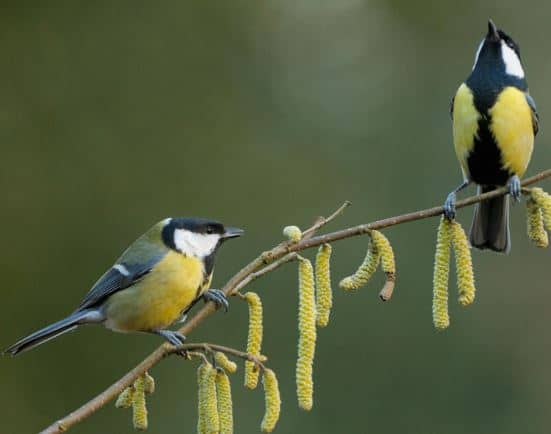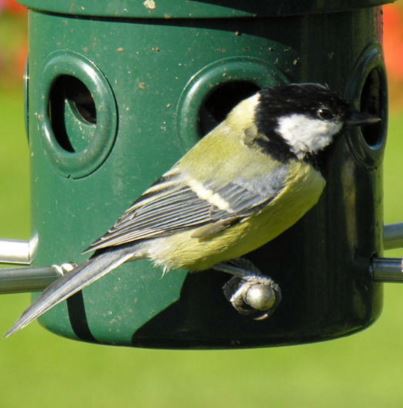Lovestruck great tits would rather starve than fly away from their mate and find something to eat, researchers from the University of Oxford have found in a new study. Imagine you were super-hungry and a restaurant just allowed your sweetheart in but not you – you would remain by the door outside while your partner ate inside rather than go and find somewhere else to eat on your own, that is, if you were a great tit.
For seventeen pairs of great tits in the Oxfordshire woods, staying close to their mate mattered more than food for box sexes, the zoologists reported in the academic journal Current Biology.
Their findings show just how important relationships are in the animal kingdom, including wild birds, the authors wrote.
 As far as great tits are concerned, being together matters more than anything else. (Image: audubon.org)
As far as great tits are concerned, being together matters more than anything else. (Image: audubon.org)
DPhil student, Josh Firth and colleagues studied 17 pairs of great tits. They all wore electronic anklets that gave out a signal which unlocked feeders full of sunflower seeds.
Sometimes the signals were set so that both mates could get into the same feeder, while on other occasions there was a mismatch, and only the male could get in, or just the female – the other one was locked out.
Great tits prefer hunger to separation
They studied the birds for three months and found that birds flew to the feeders that they were unable to open if their mate fed there, and waited outside.
In fact, the birds in mismatched pairs that could not get into the feeder spent four times longer at the feeders that were off limits than the other birds. Put simply, the pairs preferred to fly around together, even if it meant that one of them got nothing to eat, rather than fly off separately to get food.
Mr. Firth said:
“We were quite surprised to see that the pairs chose to stay together than go where they could get food themselves. They stuck with their partner and spent a lot more time at the feeder they couldn’t access.”
As occurs with humans in new relationships, the locked-out great tits found themselves spending time with their mate’s friends.
Mr. Firth added:
“Because those birds choose to stay with their partners, they also end up associating with their partner’s flock-mates, even if they wouldn’t normally associated with this individuals.”
“This shows how the company an individual bird keeps may depend on their partner’s preferences as well as their own.”
Importance of passing on one’s genes
By staying close to their mate all the time, they were making sure their bond remained strong and ensured that their genes were passed on.
The researchers only looked at the behaviours of great tits, but are sure many species of wild birds – especially those that pair up for at least one breeding season – behave in a similar way.
Even though love won over hunger, the lovestruck great tits did not wither away. The unlucky bird soon realized that a feeder did not lock for a couple of seconds after a bird took its fill and swooped in for food as the other flew away.
In their article in Current Biology, the authors concluded:
“Wild great tits shape their foraging activity around their mated partner and prioritize maintaining this relationship over their access to food.”
“This key relationship also influenced their wider social associations by altering who else they foraged with, illustrating an important feedback between social structure itself and its suggested drivers.”
Citation: “Experimental Evidence that Social Relationships Determine Individual Foraging Behavior,” Josh A. Firth, Bernhard Voelkl, Damien R. Farine and Ben C. Sheldon. Current Biology. November 2015. DOI: http://dx.doi.org/10.1016/j.cub.2015.09.075.
RSPB Video – The great tit
The great tit (Parus major) is the UK’s largest tit. It is a green and yellow bird with a striking glossy black head, white cheeks, and a distinctive two-syllable song.

